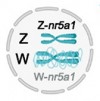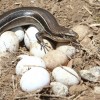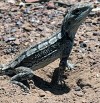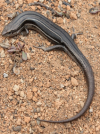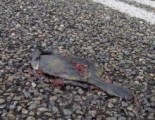
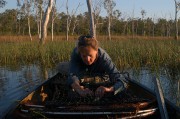



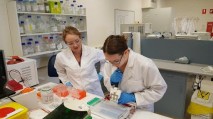
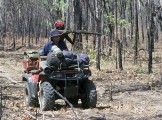
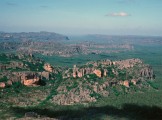

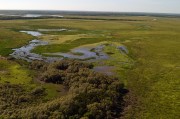

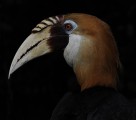

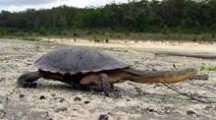

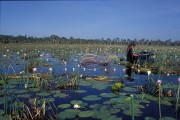
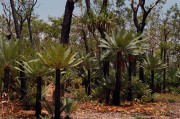

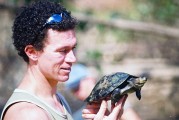


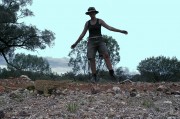
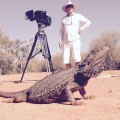
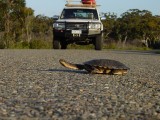
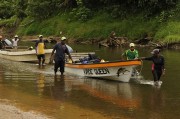


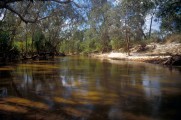
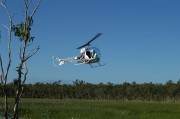
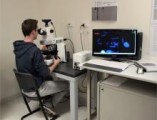
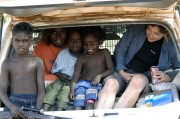


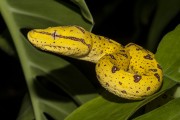
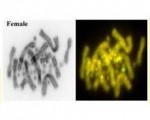
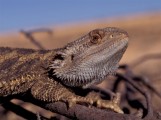
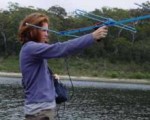

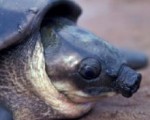

Blog
Sex in dragons -- reversal stable
Posted in Pogona Research on Feb 26, 2022
A combination of chromosomal sex determination and temperature-induced sex reversal appears to be evolutionarily stable based on evidence from an extensive field study of the central bearded dragon in central Queensland. Read more about it in a paper, led by Kris Wild, that came out today in Molecular Ecology.
Sex in Dragons -- role for chromosomal conformation?
Posted in Pogona Research on Jan 17, 2022
Reptiles have an extraordinary variety of mechanisms to determine sex. In an article that appeared in PNAS this week, we propose that altered configuration of the repeat-laden W chromosome affects the conformation of the primary transcript of a candidate sex determining gene to generate more diverse and potentially inhibitory W-borne isoforms that suppress testis determination. Epigenetics rules.
Epigenetics of the Dragon
Posted in Pogona Research on Dec 15, 2021
Great to see that the antibodies for a range of sex related proteins developed for mammals work in our model species, the dragon lizard. Our article, led by Sarah Whiteley and as a collaboration between the QIMR Berghofer Institute for Medical Research, appeared today in the journal Biology of Reproduction.
Sex reversal provides new insight to being female
Posted in Pogona Research on Apr 14, 2021
In our recent study reported in PLoS Genetics, we take the unique opportunity to compare gene regulation in the embryonic gonads of the Bearded Dragon with sex determined by chromosomes with that of embryonic gonads where female sex is determined by environmental temperature. This provides a window within which to examine how the cell senses environmental temperature then transduces via ubiquitous signalling pathways to direct the epigenetic processes that govern sex determination.
Alpine lizards reverse sex as it becomes cooler
Posted in Pogona Research on Feb 01, 2021
The alpine skink has XX/XY chromosomes like us, but unlike us the females can be converted to males in the egg by low temperatures. In a paper that appeared today in Heredity, Dumie Dissanayake shows that the frequency of sex reversal varies along an elevational gradient, and that the resultant sex ratio skew will potentially drive the loss of the Y chromosome at the highest elevations. Interesting stuff. https://rdcu.be/ceziZ.
The Hidden Sex Life of the Jacky Dragon
Posted in Pogona Research on Jan 20, 2021
Sex in dragons can be a complicated affair. In a paper published today in the Proceedings of the Royal Society of London (Proceedings B), IAE PhD student Sarah Whiteley and her colleagues present some tantalizing evidence that the TSD Jacky Dragon has an underlying predisposition to be one sex or the other, a predisposition that is over-ridden at extreme incubation temperatures.
Waking the sleeping dragon
Posted in Pogona Research on Jun 17, 2019
Those of you watching *The Desolation of Smaug* closely might have been surprised to see how quickly Smaug arose from his slumber when disturbed by Bilbo the Burglar. How is it that dragons can arouse so quickly if disturbed during hibernation? We might have the answer in our latest paper in BMC Genomics.
Feral Cat takes Niña
Posted in Pogona Research on Nov 28, 2018
A recent incident involving a feral cat and one of our treasured dragon lizards near Cunnamulla in western Queensland serves to highlight the impact feral cats are having on the Australian environment. PhD students Kris Wild and Phil Pearson tell the story.
New insights to reptile sex
Posted in Pogona Research on Jul 04, 2018
Male or female? In many reptiles sex determination is temperature-dependent. But how this works has been a mystery for 50 years... New insights have emerged from work by Chutian Ge and his collegues who show that ancient conserved epigentic machinary is involved in the thermosensitive regulation of key sex genes. Team Pogona was asked to provide a perspective on the new findings. We have received many enquiries since. In this post, we explain more fully what we believe is going on.
National Geographic funds lizard sex
Posted in Pogona Research on Mar 15, 2018
Congratulations to IAE student, Duminda Dissanayake, on receiving a grant from the National Geographic to progress understanding of sex reversal by temperature in the three-lined skink and to advance broader implications of sex reversal more generally. Sex reversal in the XX/XY skink complements sex reversal in the ZZ/ZW dragon very nicely indeed.

